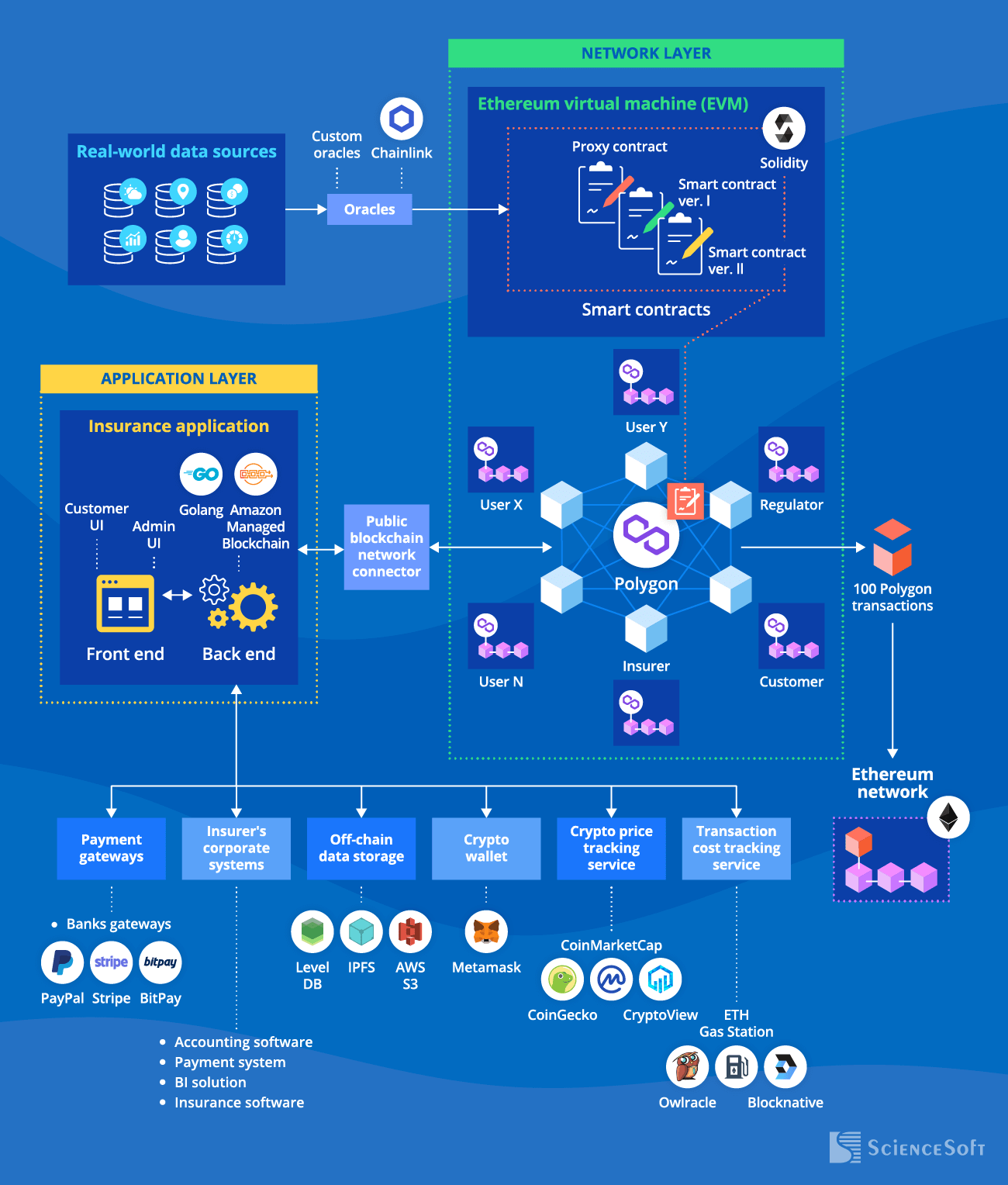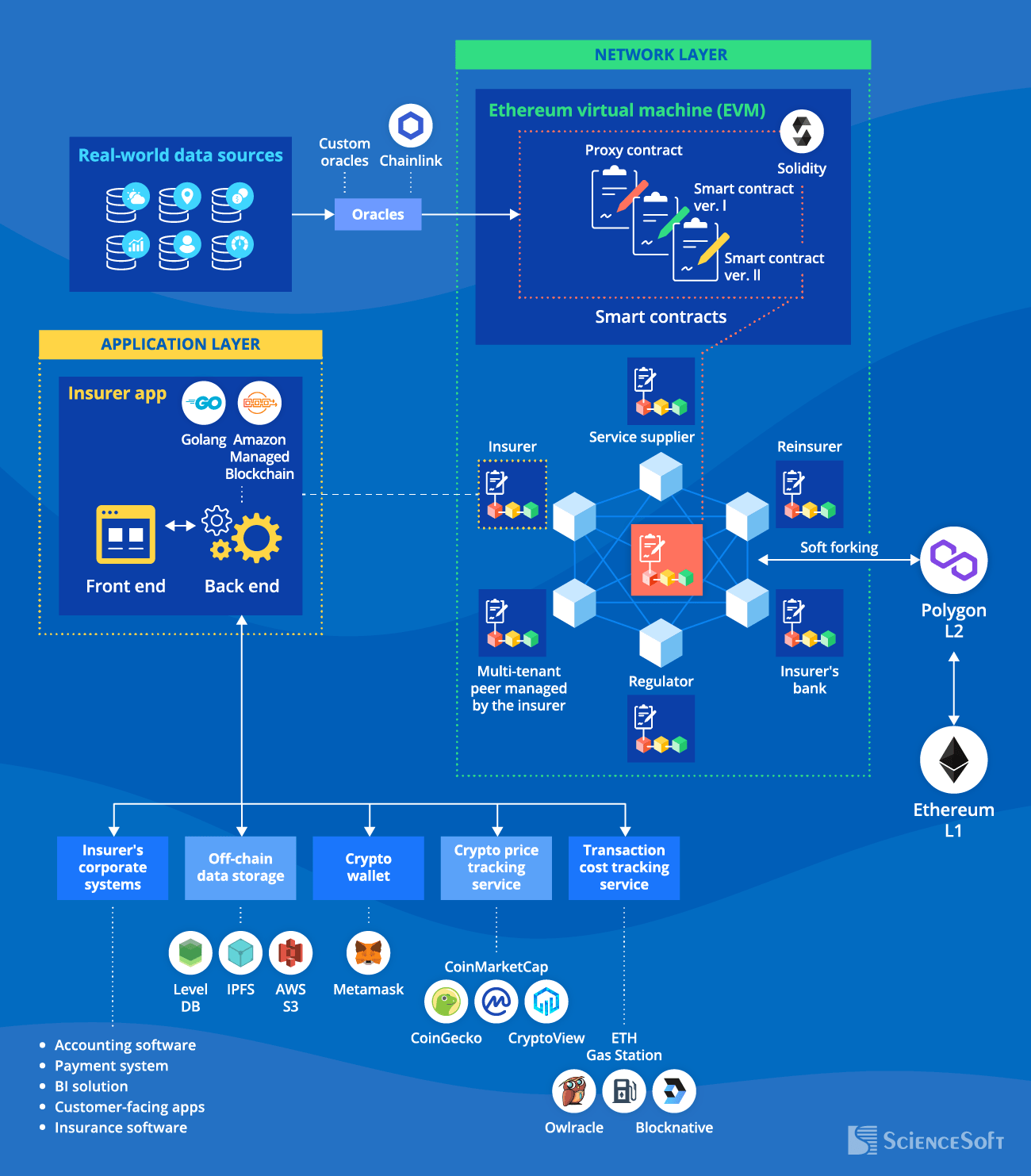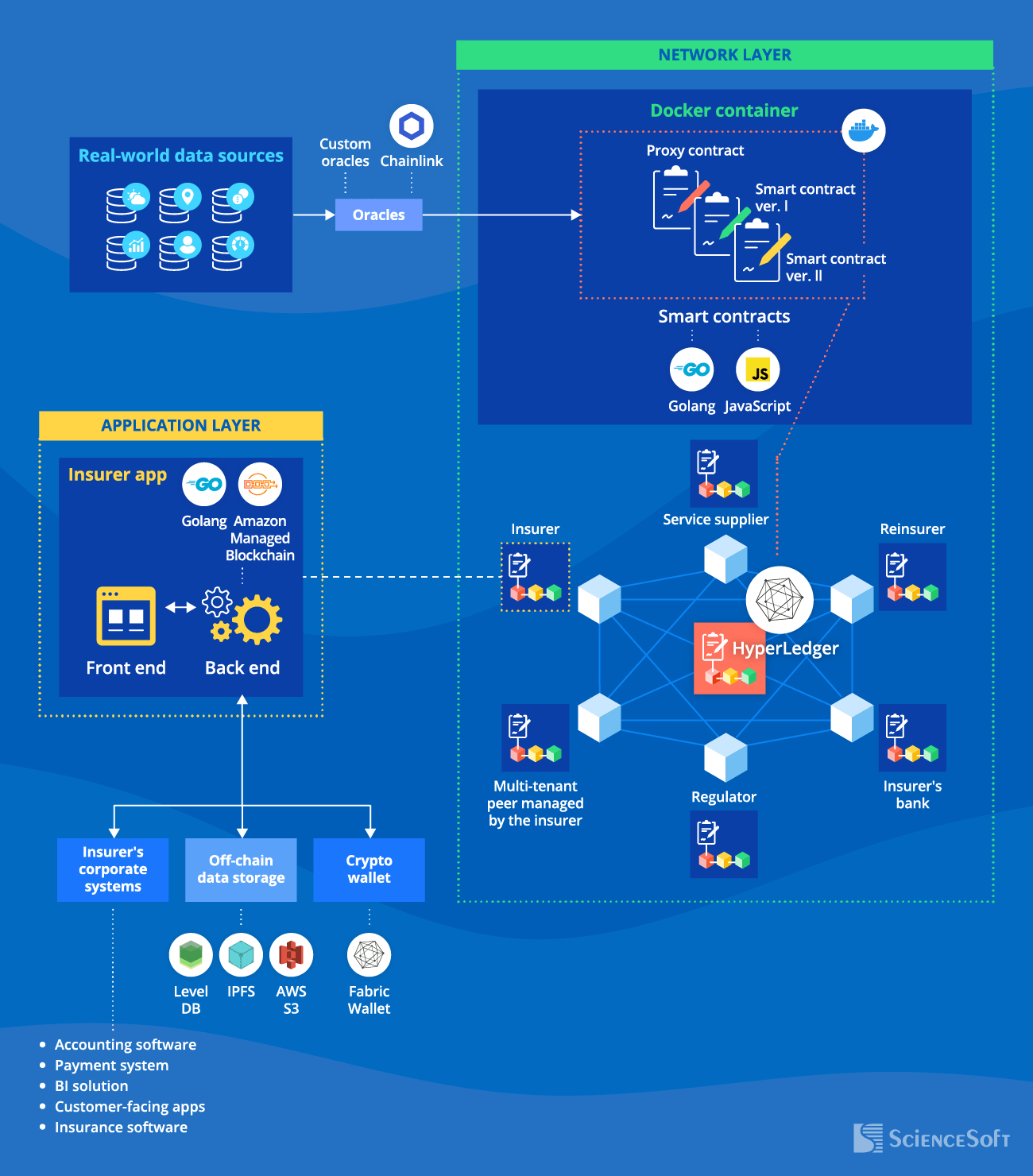Smart Contracts in Insurance
Architecture, Tech Stack, Success Stories
In insurance software engineering since 2012 and in blockchain development since 2020, ScienceSoft helps insurance companies create reliable, compliant smart contract solutions.
80%+ Insurers Already Use or Plan to Employ DLT
Accenture Technology Vision survey revealed that more than 80% of insurance companies have already adopted the distributed ledger technology (DLT) or are planning to invest in blockchain in the coming years.
As smart contracts lay the foundation for blockchain-based insurance technology, their use in the insurance sector shows continuous and sustainable growth.
Popular smart contract use cases in insurance
Insurance pricing
Regulatory reporting
Risk and compliance
Smart Contracts in Insurance: The Essence
When used in insurance, smart contracts introduce effective automation of customer risk scoring, policy issuance, claim validation, regulatory reporting, and other rule-based manual workflows. They instantly intake and process data from an insurer’s corporate systems and relevant third-party sources to accelerate underwriting and claim resolution cycles. In addition, smart contracts help prevent fraud and compliance breaches and improve data security by providing immutable records of insurance transactions and events.
In terms of their nature, smart contracts are self-validating and self-executing protocols that comprise automation rules based on multi-party insurance agreements, established business workflows, compliance requirements, etc.
From a technical standpoint, you may think of smart contracts as APIs enabling the connection between an insurance application and a blockchain network.
Two key approaches to implementing smart contracts in insurance
Developing and deploying smart contracts on a third-party platform
A fast and cost-effective way to implement insurance smart contracts. However, with this option, the blockchain architecture and recordkeeping rules cannot be customized to your needs. Plus, transaction fees vary significantly across the platforms, so you need to accurately assess the economic feasibility of relying on a particular platform.
Building a custom blockchain network and creating dedicated smart contracts on it
While it requires larger upfront investments, this option allows you to choose the preferred consensus mechanism, doesn’t pose limitations to the smart contract logic, ensures minimal operational and security risks. This approach is especially beneficial if you plan to involve multiple parties (e.g., other carriers, reinsurers, regulators) to participate in the blockchain. It enables streamlined and transparent multi-party collaboration, driving higher ROI for the initiative.
Popular blockchain platforms and frameworks that support smart contracts
Ethereum, Hyperledger Fabric, Solana, Tezos, Cardano, Cosmos SDK, Corda, NEM.
Main architectural components of a smart contract solution for insurance
- Smart contracts, including proxy contracts enabling protocol updatability.
- Smart contracts’ underlying blockchain (the network hosting a blockchain ledger and the sandboxed environment that executes the smart contract code).
- Off-chain storage to avoid the power-consuming storing of insurance data and metadata in the blockchain.
- Oracles enabling data intake from the off-chain sources.
- An app providing role-specific user interfaces to submit and trace transactions in the blockchain.
Architecture Options for the Insurance Smart Contracts
Below, ScienceSoft’s smart contract development team describes the architecture options we typically employ to create smart contract solutions for insurance.
1. Smart contracts utilizing a third-party blockchain network
|
|
|
|
|
The essence: Smart contracts are hosted and executed on a third-party blockchain. Insurance transactions are recorded in the public ledger and can be accessed by all third-party network participants. |
|
|
|
In this option, we architect:
- A customer-facing insurance application and its integration points with the required insurer’s and third-party systems.
- A smart contract solution hosted on the chosen blockchain network to automate the required insurance operations (e.g., policy issuance and renewal, claim-associated payouts, etc.).

We employ decentralized oracles (Chainlink’s or custom-built) that run consensus-based validation of the off-chain data prior to relaying it to the blockchain. It helps increase the reliability of the external data feeds and minimize smart contract security risks.
2. Smart contracts utilizing a private blockchain network
|
|
|
|
|
The essence: Smart contracts are hosted and executed on a custom blockchain operated by a particular insurer. Insurance data and transactions can be submitted, accessed, and validated only by known and authorized parties. |
|
|
|
In case a client wants a private blockchain, we usually go with one of the two architectural scenarios:
2.1. Forking the existing blockchain network
We create a soft fork of an existing blockchain network and write dedicated smart contracts to run on the new blockchain.
Compared to building a blockchain network from scratch, this option offers 1.5–2x faster delivery and lower development costs due to using an already existing network concept and architecture. Again, we suggest forking a Layer 2 network (here, Polygon) to ensure blockchain scalability and cost-effective transactions. Ethereum-based Layer 2 networks offer solid frameworks and pre-built components to streamline smart contract implementation while ensuring high-quality protocols. Your own blockchain inherits high interoperability and seamless support for payments in crypto.

2.2. Building a new Hyperledger Fabric-based blockchain network
We create a blockchain network based on the Hyperledger Fabric framework and write the chaincode.
Hyperledger Fabric has a flexible modular structure, which means we can set up the consensus mechanism of a client’s choice and implement custom smart contract logic and tailored functionality. Smart contracts, or chaincode, in Hyperledger Fabric can be programmed in JavaScript, Golang, or Java. It makes the solution easy to evolve without the need to acquire skills in specific smart contract programming languages. Unlike Ethereum, Hyperledger Fabric fully eliminates anonymity and the need for cryptocurrencies to transact in the network. In this scenario, crypto wallets are used to securely store digital identities and facilitate access to the network.

The choice between the two architectural options depends on your business needs. Below, ScienceSoft’s experts compiled a high-level comparison of Polygon-based vs. Hyperledger Fabric-based blockchains to help you decide on the best-fitting option:
|
|
Forked blockchain (example: Polygon-based) |
Hyperledger Fabric-based blockchain |
|---|---|---|
|
Consensus mechanism
|
Proof of stake |
Proof of authority or Byzantine fault tolerance |
|
Anonymity
|
Yes |
No (preliminary authentication required) |
|
Data privacy
|
Data hash can be accessed by the L1 and L2 network participants |
Full privacy |
|
Smart contract languages
|
Solidity |
JavaScript, Golang, Java |
|
Crypto payments
|
Yes |
No |
|
Transaction per second
|
7K–65K |
3.5K–20K |
|
Cost of transaction
|
On average, $0.001–$0.01 |
0 |
|
AWS services, cost per hour
|
$0.48 |
$1.93 |
|
MVP development timelines
|
2+ months |
3–5+ months |
|
Best for
|
Companies planning to use the blockchain ecosystem for handling insurance-related payments. |
Companies whose primary need is secure and transparent recordkeeping of multi-party insurance transactions. |
Robust Tech Stack for Smart Contract Development
In our insurance smart contract development projects, ScienceSoft's teams typically rely on the following techs and tools:
Smart contract development and testing frameworks
Blockchain frameworks and networks
Blockchain cloud services

DevOps
Containerization
Automated deployment and configuration
Pre-built tools and frameworks do streamline smart contract development, upgrading, and deployment. However, the most important part – formalization of the insurer’s unique business rules in smart contracts – involves a considerable amount of custom code and requires extensive technology background, creativity, and deep knowledge of the insurance industry specifics.
How the Insurance Industry Succeeds With Smart Contracts
Weather Insurance Smart Contract Development for the Lemonade Crypto Climate Coalition
Use case: The Lemonade Crypto Climate Coalition, funded by the Lemonade Foundation, a non-profit insurtech company, implemented the eco-friendly blockchain and smart contracts for parametric insurance. The smart contract solution automates weather risk assessment, calculation of due premium amounts, damage evaluation, and claim settlement. It helps promptly, accurately, and efficiently insure vulnerable communities against climate changes. Plus, with the immutable record of data on the pool capital staking and blockchain-based claim payouts, the insurance process participants and project investors get full transparency and reduced cost of reinsurance processes.
Key techs: Avalanche, Solidity, Golang, Chainlink, LevelDB, Truffle, Arc Solidity framework.
Health Insurance Smart Contract Development for MetLife, the World’s 7th Largest Insurance Company
Use case: MetLife Asia, a part of the global insurance giant MetLife, used the blockchain and smart contracts as the foundation for their world’s first automated insurance solution for gestational diabetes. The health insurance smart contracts enable automated underwriting and policy issuance, while the blockchain technology allows for fast and secure exchange of sensitive data between the insurer, customer, and other parties. The true disruption happens at the claim resolution stage, where smart contracts enforce the automated compensation payouts upon the diagnosis, with no need for the customer to submit a claim. It helps insurers drastically improve employee productivity, speed up the claim cycle, and deliver a seamless customer experience.
Key techs: Ethereum, Solidity, OpenZeppelin, Waffle, Embark.
ScienceSoft: Over a Decade at the Forefront of Insurtech
- Since 2012 in software development for the insurance industry.
- Seasoned blockchain developers skilled in Solidity, Vyper, Rust, Golang, etc.
- Proficience in leading blockchain and smart contract frameworks: Ethereum, Hyperledger Fabric, Graphene, Truffle, Hardhat, OpenZeppelin, and more.
- Compliance experts with 6+ years of experience to ensure smart contracts meet the necessary regulations.
- Since 2003 in cybersecurity to reliably protect your blockchain-based software from cyber threats.
Our awards, certifications, and partnerships
Build Your Insurance Smart Contracts With ScienceSoft
ScienceSoft designs and builds smart contract solutions that help insurers achieve high efficiency, transparency, security, and full traceability of their business operations.
It's High Time to Go ‘Smart’
|
|
Smart contracts drive huge cost savings. According to BCG, blockchain and smart contracts have the potential to bring $200B+ decrease in operating costs for P&C insurers only. |
|
|
Smart contracts accelerate the insurance processes. For example, smart-contract-based automation can cut the overall time for claim settlement by 3x+. In turn, prompt and accurate insurance services lead to increased customer satisfaction and a higher retention rate. |
|
|
Smart contracts are the future. As soon as the legal framework for smart contract use is in place, algorithmic contracts are believed to gradually replace traditional insurance agreements. Smart contracts execute multi-party transactions in a more efficient, secure and transparent manner. |
|
|
Smart contract market grows rapidly. Driven largely by the increasing demand for blockchain-supported insurance automation, the global smart contract market is projected to witness 5x growth and hit $1.46 billion by 2030. |


Make Your Smart Contracts Drive the Max ROI for Your Unique Insurance Processes!
And if you need professional help with building reliable, secure, and cost-efficient architecture for them, we'll be glad to help.





